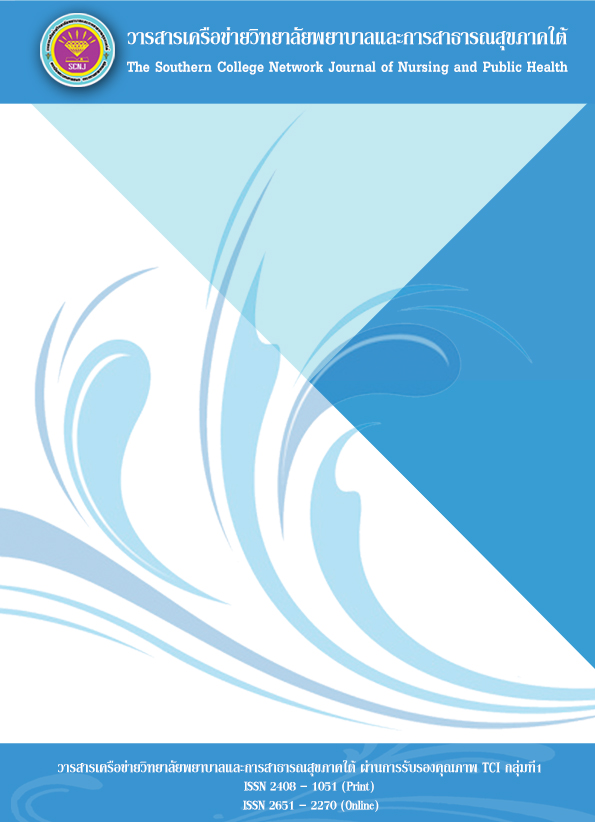การพัฒนารูปแบบการดูแลผู้ป่วยจิตเภทที่บ้านให้ได้รับประทานยา ตามเกณฑ์การรักษาในชุมชนแห่งหนึ่งจังหวัดยะลา
คำสำคัญ:
พฤติกรรมการรับประทานยาตามเกณฑ์การรักษา, ผู้ป่วยจิตเภทที่บ้าน, รูปแบบการดูแลบทคัดย่อ
การวิจัยเชิงปฏิบัติการนี้ มีวัตถุประสงค์เพื่อศึกษาพฤติกรรมการรับประทานยาของผู้ป่วยจิตเภทที่บ้าน และประเมินประสิทธิผลของรูปแบบการดูแลให้ผู้ป่วยจิตเภทที่บ้านได้รับประทานยาตามเกณฑ์การรักษาในชุมชนแห่งหนึ่งจังหวัดยะลา กลุ่มตัวอย่างเป็นผู้ป่วยโรคจิตเภทที่อาศัยในชุมชนแห่งหนึ่งในจังหวัดยะลา เลือกกลุ่มตัวอย่างแบบเฉพาะเจาะจง จำนวน 24 คน วิธีการดำเนินการวิจัย มี 3 ขั้นตอน 1) ศึกษาพฤติกรรมการรับประทานยาของผู้ป่วยจิตเภทที่บ้าน 2) พัฒนารูปแบบการดูแลผู้ป่วยจิตเภทให้ได้รับประทานยาตามเกณฑ์การรักษาแบบมีส่วนร่วม โดยใช้ทฤษฎีกระบวนการพยาบาล ของ Orlando (1961) และการทบทวนวรรณกรรม 3) ประเมินประสิทธิผลของพฤติกรรมการรับประทานยาก่อน-หลังการใช้รูปแบบการดูแลผู้ป่วยจิตเภทให้ได้รับประทานยาตามเกทตามเกณฑ์การรักษา เครื่องมือวิจัย มี 3 ชุดประกอบด้วย 1) แบบวัดพฤติกรรมการรับประทานยาของผู้ป่วยจิตเภท มีค่าสัมประสิทธิ์แอลฟาของครอบบาค เท่ากับ.75 2) แบบรวบรวมข้อมูลการรับประทานยาของผู้ป่วยจิตเภทโดยการสัมภาษณ์ผู้ป่วยและผู้ดูแลในแต่ละครอบครัว ได้รับการตรวจสอบจากผู้ทรงคุณวุฒิ 3 คน มีค่าความตรงเชิงเนื้อหา (IOC) เท่ากับ .67 – 1.00 3) รูปแบบการดูแลให้ผู้ป่วยได้รับประทานยาตามเกณฑ์การรักษา ได้รับการตรวจสอบจากผู้ทรงคุณวุฒิ 3 คน มีค่าความตรงเชิงเนื้อหา (IOC) เท่ากับ .80 เก็บรวบรวมข้อมูลโดยใช้แบบวัดพฤติกรรมการรับประทานยาของผู้ป่วยจิตเวช วิเคราะห์ข้อมูลเชิงปริมาณด้วย ความถี่ ร้อยละ ค่าเฉลี่ย ส่วนเบี่ยงเบนมาตรฐาน สถิต paired t-test ผลการวิจัยพบว่า
1. ผู้ป่วยจิตเภทที่บ้านมีพฤติกรรมการรับประทานยาอยู่ในระดับต่ำ ร้อยละ 70.83 ระดับปานกลาง ร้อยละ 25.00 และระดับดี ร้อยละ 4.16 ความสามารถในการสังเกตและจัดการกับอาการจากฤทธิข้างเคียงของยา ระดับปานกลาง ร้อยละ 58.33 ระดับต่ำ ร้อยละ 37.50 และระดับดี ร้อยละ 4.16
2. รูปแบบการดูแลให้ผู้ป่วยได้รับประทานยาตามเกณฑ์การรักษา ประกอบด้วย 1) การสร้างสัมพันธภาพ 2) การบอกความสำคัญและความจำเป็นในการรับประทานยา 3) การให้การปรึกษา 4) ส่งเสริมความมีคุณค่าของผู้ดูแลและผู้ป่วย 5) ข้อมูลแหล่งสนับสนุนทางสังคม 6) จิตอาสา 7) การประสานงานกับผู้เกี่ยวข้องเพื่อช่วยเหลือผู้ป่วยและผู้ดูแล 8) การส่งต่อรับการรักษา
3. ประสิทธิภาพของรูปแบบการดูแลให้ผู้ป่วยได้รับประทานยาตามเกณฑ์การรักษา โดยการรูปแบบไปใช้กับกลุ่มตัวอย่าง พบว่า ผู้ป่วยจิตเภทหลังได้รับการพัฒนารูปแบบการรับประทานยามีพฤติกรรมการรับประทานยาตามเกณฑ์การรักษา เฉลี่ยสูงกว่าก่อนได้รับการพัฒนารูปแบบการดูแลให้ผู้ป่วยจิตเภทได้รับประทานยาตามเกณฑ์การรักษา อย่างมีนัยสำคัญทางสถิติ (t=19.64, p<.001)
รูปแบบการรับประทานยามีพฤติกรรมการรับประทานยาตามเกณฑ์การรักษา สามารถนำไปใช้กับผู้ป่วยจิตเภทที่บ้านที่รับประทานยาไม่ได้ตามเกณฑ์การรักษา
References
Anongnud, S. (2011). Journal of Srithanya Hospital. Establishing Drug Compliance, 11(11), 55-58. (in Thai)
Boontoch, K., Sricamsuk Saito, A., & Arunpongpaisal, S. (2013). Social Support in Patients with Schizophrenia. Journal Psychiatric Associate Thailand, 58(1), 89-100. (in Thai)
Chiewsothorn, S. (2002). The Effect of Empowerment in Schizophrenic Patients on Medication Adherence Behaviors. Thesis of Master of Nursing. Faculty of Nursing. Chulalongkorn University. (in Thai)
Dobber, J., Latour, C, Haan, L. D., Reimer, W. F., Peters, R, Barkhof, E., & Meijel, B. (2018). Medication Adherence in Patients with Schizophrenia: a Qualitative Study of the Patient Process in Motivational Interviewing. BMC Psychiatry. Retrieved February 2, 2019 from https://www.ncbi.nlm.nih.gov/pmc/articles/PMC5960122/pdf/12888_2018_Article_1724.pdf
Juntapim, S., Nuntaboot, K. (2018). Care of Schizophrenia Patients by the Community. Journal of Nursing and Health Care, 36(2), 68-76. (in Thai)
Laongsri, S., Srichaikul, B., & Pimchan, N. (2017). The Development of Care Model for Psychaitric Patients in the Community Tambol Phai, Rattanaburi District, Surin Provinc. The Journal of Boromarajonani College of Nursing Nakhonratchasima, 23(2), 68-79. (in Thai)
Matsuda, M., & Kohno, A. (2012). Effects of the Nursing Psychoeducation Program on the Acceptance of Medication and Condition-Specific Knowledge of Patients with Schizophrenia. Archives of Psychiatric Nursing. Retrieved February 4, 2019 from https://magazine.nursing.jhu.edu/. https://www.ncbi.nlm.nih.gov/pubmed/ 27654241
Meesri, K., & Dangdomyouth, P. (2012). Selected Factors Related to Capabilitys Among Caregivers of Schizophrenic Patients in Community. The journal of Psychiatric Nursing and Mental Health, 26(1), 35-49. (in Thai)
Meijel, B, Kruitwagen, C, Gaag E, Kahn, R. F., & Grypdonck, M. H. F. (2006). An Intervention Study to Prevent Relapse in Patients With Schizophrenia. Journal of Nursing Scolarship, 38(1), 42-49.
Orem, D. E. (1991). Nursing: Concepts of Practice (4th ed.). St. Louis, MO: C. V. Mosby.
Orlando, Ida Jean, (1961). The Dynamic Nurse-Patient Relationship . Retrieved January 4, 2019 from https://www.nursing-theory.org/theories-and-models/orlando-nursing-process-discipline-theory.php. (5 January 2019)
Pitschel-Walz, B, J., Bender, W., Endel R. R., & Wagner, M. (2006). Psychoeducation and Compliance In the Treatment of Schizophrenia: Results of the Munich Psychosis Information Project Study. Journal of Clinical Psychiatry, 67(3), 443-452.
Podhisita, C. (2013). Science and art of Qualitative Research (4th ed.). Bangkok: Amarin Printing & Publishing Public. (in Thai)
Posri, A. (2018). Family and Community Participation in Caring of Chronic Schizophrenic Patients: Study of Nongnasang Community. Journal of The Royal Thai Army Nurses, 19(May-August), 239-241. (in Thai)
Punyapinijnugool, C., & Harabutra, T. (2018). Happiness and the Establishment of Relationships. Kasem Bundit Journal, 19(1), 236-247.
Rakkarn, J. (2006). The Effect of Family Psychoeducation on Burden among Family Caregivers of Schizophrenic Patients in Community. Thesis of Master of Nursing. Faculty of Nursing. Chulalongkorn University. (in Thai)
Saengpak, C., Tungpunkom, P., & Kitsumban, V. (2017). Effect of the Adherence Therapy on Medication Adherence Among Persons with Schizophrenia in Community. Nursing Journal, 44(1), 137-148. (in Thai)
Staporntera, P., & Sawangchareon, K. (2018). Empowerment for Male Schizophrenia with Low Self-Esteem. The Journal of Boromarajonani College of Nursing, Nakhonratchasima, 24(2), 145-154. (in Thai)
Thongtup, P., & Sawangchareon, K. (2013). Violent Behavior of Schizophrenic Patients and Management of Family. The journal of Nurses’ Association, North-Eastern Division, 31(4), 121-127. (in Thai)
Van, M, M. (1990). Researching Lived Experience: Human Science for an Action Sensitive Pedagogy. New York: State University New York.
Wattanasiri, O., & Sripusito, S. (2013). The Development of Process of Continuity Care in Schizophrenia Patients by Interdisciplinary Team and Care Giver Network of Kamphang- Phet Hospital. Journal of Nursing Division, 40(1), 67-83. (in Thai)
Wold Health Organization. (2018). Schizophrenia (Mediacenter: Fact Sheet). Retrieved January 4, 2018 from https://apps.who.int/mediacentre/factsheets/fs397/en/index.html.
Wuthironarith, V. (2017). Promoting Medicationadherence in Persons with Schizophrenic in Community. The journal of Psychiatric Nursing and Mental Health, 31(1), 1-12. (in Thai)
Downloads
เผยแพร่แล้ว
ฉบับ
บท
License
1. บทความหรือข้อคิดเห็นใด ๆ ที่ปรากฏในวารสารเครือข่าย วิทยาลัยพยาบาลและการสาธารณสุขภาคใต้ ที่เป็นวรรณกรรมของผู้เขียน บรรณาธิการหรือเครือข่ายวิทยาลัยพยาบาลและวิทยาลัยการสาธารณสุขภาคใต้ ไม่จำเป็นต้องเห็นด้วย
2. บทความที่ได้รับการตีพิมพ์ถือเป็นลิขสิทธิ์ของ วารสารเครือข่ายวิทยาลัยพยาบาลและการสาธารณสุขภาคใต้







